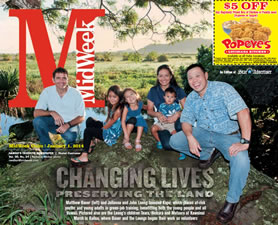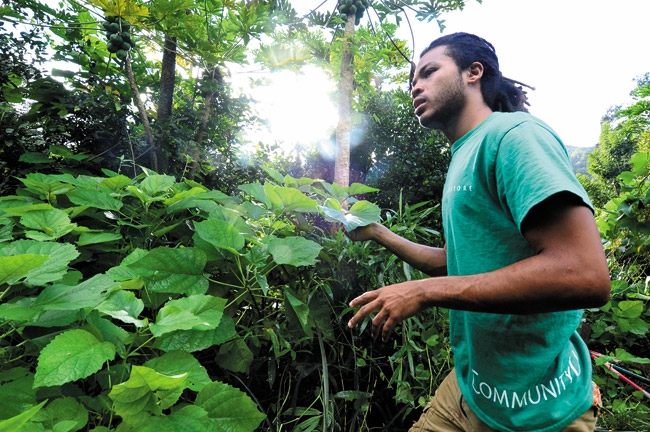Changing Lives Preserving The Land
Kupu provides training in green jobs for teens and young adults, providing skills that benefit the land and, in the long run, the entire state
As 19-year-old Paul Jackson pulls invasive plants out of the community garden at Hooulu Aina nature preserve in the back of Kalihi Valley, he pauses periodically to explain the healing properties of things he encounters.
mw-cover-010113-kupu-2
“This,” he says, holding up honohono and rubbing it on a small cut on his arm, “takes away an itch and it helps heal up cuts.”
His knowledge of what he sees in the garden is encyclopedic – this one can help take care of a cough and that one can get rid of cold symptoms – and he has plans to go back to school to study naturopathic medicine.
But not too long ago, Jackson was, as he puts it, directionless. He grew up in Halawa Housing, and after dropping out of high school in his freshman year, he had been working as a prep cook at one restaurant and as a busboy at another.
“The teachers kind of told me, ‘You’re no good, drop out,'” Jackson says.
He liked cooking, but he wanted to go back to school. His interest in natural medicine was sparked about seven weeks ago when he joined the group he’s working with at Hooulu Aina: Kupu’s CommunityU program.
Kupu, which means to “sprout” or “grow” in Hawaiian, is a nonprofit that offers experiential green job training, including natural resource management and conservation, for young adults ages 16-24, while also fostering leadership skills through hands-on activities.
Launched in 2007 by husband and wife John and Julianna Leong and Matthew Bauer of parent company Pono Pacific, Kupu now serves more than 300 youths per year, providing 230,000 service hours to its 80 partner organizations on five islands. CommunityU, which targets at-risk and underserved youths, is one of Kupu’s seven programs. Currently, Kupu is on the cusp of even bigger things – it recently launched a capital campaign to expand its headquarters at Kewalo Basin, improve its facilities and ultimately widen its reach.
But for all of the impacts that Kupu has had so far, the co-founders say it is not about them, or even about today. Kupu sees its real significance somewhere on the horizon – in a healthier environment and in a better future for the lives of the youths with whom they work.
“I think Kupu is about restoring life in Hawaii,” says John, the executive director. “And it is not just about the resources, although that is a big part of it. A lot of it also is about changing lives and teaching the next generation. God has blessed us with such an amazing place to live, and we not only want to care for it today, but also teach the youth how to be better stewards for tomorrow.”
While Kupu is now a large – and growing – organization, it all started in John’s parents’ garage.
As a business student at University of Pennsylvania, John had been an aspiring entrepreneur. But while away from the Islands, John, who grew up in Nuuanu and graduated from Punahou, really began to appreciate the fragility of the Hawaiian ecosystem. He also missed the strong community life that Hawaii seemed to nurture. So, although he had job offers in New York City and San Francisco, there didn’t seem to be a choice: He knew he had to move home and strive to enrich the local community.
In 2000, John created Pono Pacific to provide natural resource management for conservation agencies and landowners. Soon, he was joined by Julianna, whom he had met at Punahou, and Bauer, who learned of Pono Pacific and, on a whim, decided to email John. Like John, both Julianna and Bauer had attended Mainland colleges but returned to the Islands as soon as they could.
Living at home with their parents and working part-time jobs, the three spent their free time building Pono Pacific. Working with a shared computer and borrowing cars to get to and from work sites, the trio spent those early days in the field, clearing Maunawili Trail and removing invasive species from Kawainui Marsh.
“Our work was rewarding,” recalls Julianna, who was Kupu’s first executive director and now serves on the board. “There was a sense of satisfaction at the end of the day. But I think there came a point where it felt like our work was just a drop in the bucket of meeting the conservation needs in Hawaii. And it felt like it was only going to be a drop in the bucket until there were more people who were engaged.”
Pono Pacific had been running a volunteer conservation program for students since 2001, and by 2006 they noticed that the interest was growing. In response, they launched Kupu to engage the community in preservation and to build up the next generation of conservation leaders.
“It has been neat because we not only have seen more people get into the conservation careers, but we have seen where we are impacting the more at-risk youths, too, and their lives turning around, going from really challenged backgrounds to now,” John says.
Kupu’s programs include RISE, which places college students and recent graduates in green-collar internships for projects that involve clean energy, sustainable development and more. RISE interns have conducted projects that include helping TheBus reduce diesel emissions. The E2U Program works with the state Department of Education to train young adults in energy conservation. Hawaii Youth Conservation Corps (HYCC) is comprised of three sub-programs that include summer field work, a year-long conservation internship and an ongoing community service venture. CommunityU participants also take part in activities such as college visits and financial literacy training in addition to field work.
“I think some of the issues we work with are on the minds of a lot of youths, with global warming and other large global problems,” says Bauer, Kupu’s director of operations. “And actively being engaged with their hands to solve these problems is empowering.”
Kupu also provides a valuable service to its partner organizations.
“We have become a farm school for a lot of organizations, and I think they know that when they bring somebody in from Kupu, they are going to have a lasting impact,” John says.
According to the Kupu annual report for 2012, 60 percent of RISE interns, 28 percent of HYCC extended interns and 83 percent of CommunityU interns gained employment related to their Kupu experience.
Kupu interns also have been using their newfound skills to help their neighbors. Last year, a group of E2U interns conducted an energy audit of more than 180 homes, giving advice to homeowners on how they can be more efficient.
“Some people saved $200 a month,” John says. “And a lot of them were coming from a place where they really needed help with their energy costs.”
The Leongs and Bauer can rattle off a laundry list of memorable past interns, many of whom have gone on to establish careers in related industries. There’s Emma Yuen, a former HYCC participant who now works at the state Department of Land and Natural Resources and was instrumental in securing funding for watershed preservation. There’s Jon Brito from Molokai, an HYCC intern who went on to become a team leader through Ameri-corps and now attends college on Maui.
“It just provides an opportunity for people to realize their own potential as individuals,” Julianna says.
Working alongside Jackson in the Hooulu Aina garden are about 10 other youths in CommunityU. Together, they pull out bunches of invasive plants, yanking long vines or chopping at shrubs, and then take turns delivering the plants to the compost pile.
Darla Simeona of Kokua Kalihi Valley, which runs the nature preserve, explains that the goal of today’s work is to increase food space in the garden. The invasive plants grow so quickly and abundantly that they’re now encroaching on the vegetables.
“We love working with Kupu,” Simeona says. “They get so much work done. Even with a small amount of people, they work well together, and they are not scared of hard work. They help us out a lot.”
CommunityU participant Jessica Pojas strategizes with another volunteer on how to best cut a thick vine of an invasive plant.
After moving back home following graduation from Oregon State University, Pojas knew that she wanted to work with environmental issues, but she wasn’t quite sure where to start. After weeks searching, she found Kupu.
“With this program, it is good because they have different ways of doing environmental work,” Pojas says, adding that it has introduced her to a range of companies.
As of this day, the group is two days away from their graduation. It’s their second day at Hooulu Aina, and they have spent the last few weeks working at other sites, including a couple of fish ponds and a loi.
Pojas hopes to continue her time with Kupu and already has applied to an extended internship for one program, and as team leader for another.
Meanwhile, 19-year-old Ashley Watkins clears a thicket of large weeds. Prior to joining CommunityU, Watkins “wasn’t doing much.” The California native had dropped out of school in eighth grade, and after getting fired from her job at a bookstore, she went to live with her mother and siblings in a small town. But when her job search didn’t pan out and she got tired of the crowded house, she came to Hawaii to live with her father.
When CommunityU ends, Watkins hopes to be accepted into a Kupu-run program to prepare for the GED – and ultimately aims to attend art school. Watkins, who loves to sketch, has found her work with native plants inspiring. But most of all she has enjoyed the sense of community that Kupu fosters – the kind of support that she says she hasn’t felt since she was a kid.
As graduation approaches, Jackson looks forward to starting at Leeward Community College in the spring. He’s already signed up for classes, and he also hopes to pursue an internship or job at one of the sites he’s worked with to learn more about natural medicine.
“I am excited, I really am,” he says. “That’s all I have been thinking about.”
For Kupu, stories like these are the crux of what they do.
“Just to see that is a huge victory for us,” John says. “If we can get them to go either to the other programs that Kupu offers or get employment afterward, it is to turn their lives around and realize that they have potential and that they can do something positive with their lives. That is a huge victory for us.”
Looking ahead, Kupu hopes that its work can benefit not only the kids and the environment, but the community at large as well.
“The big challenge is how do you become replicable, how do you build capacity in other people – within the organization but also outside in the community,” Julianna says. “Kupu is doing something great, but I think the more irrelevant we can become – because those values are already within the community – I think the better we can be.”
“We are just doing our part,” John adds. “I feel like we were passed a baton from others who have come before us, with the hopes that we would do something good with it. Right now we are just carrying that baton and trying to pass it on to the next generation.”
For more information on Kupu, call 735-1221 or visit kupuhawaii.org.







